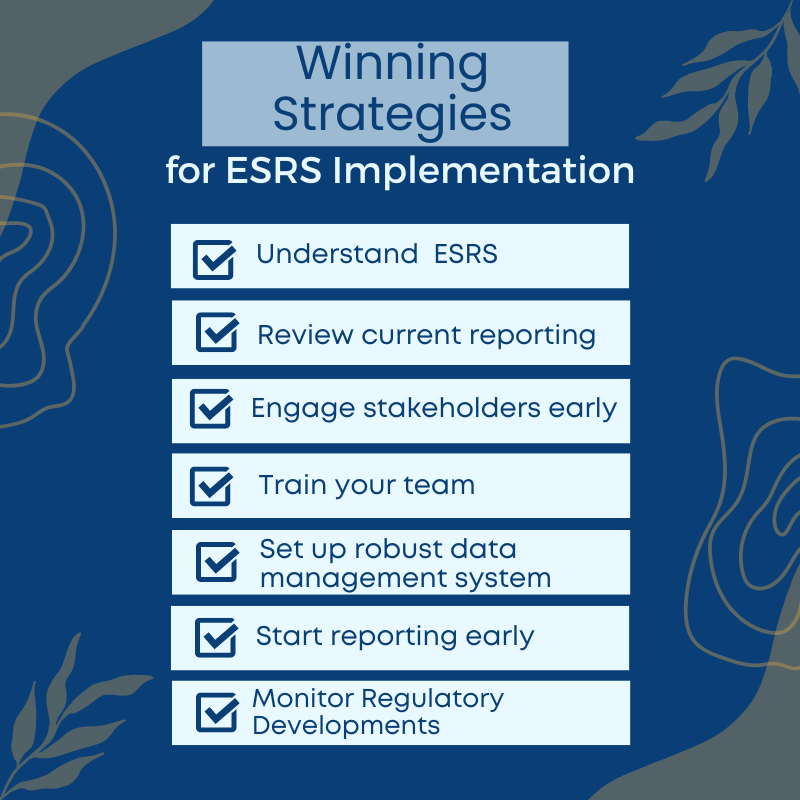What is the aim of the Corporate Sustainability Reporting Directive?
Published in 2022 and effective since 2023, the CSRD is anticipated to revolutionize the realm of sustainability reporting in Europe and across the globe. The aim of the Corporate Sustainability Reporting Directive (CSRD) is to enhance the reliability, comparability, and findability of sustainability information disclosed by companies. The CSRD requires companies to provide a specific format for presenting their sustainability report, aligning it with the EU taxonomy and addressing prevalent societal and environmental challenges.
The CSRD also aims to fill the gaps in the existing non-financial reporting directive (NFRD) and to streamline the ESG regulation framework by mandating companies to report on specific ESG indicators. The reporting framework under CSRD aims to promote transparency by adhering to global reporting standards, allowing investors to make informed decisions about the risks and opportunities of the investment. By strengthening the reporting requirements, the CSRD aims to ensure the availability of reliable information that can help stakeholders make informed decisions towards sustainable business practices.
Ultimately, better sustainability reporting will help the businesses to improve their operations and contribute positively to the society and the environment.
Who is subject to the Corporate Sustainability Reporting Directive? and When do companies have to start reporting for the CSRD?
The Corporate Sustainability Reporting Directive (CSRD) imposes reporting requirements for sustainability reports on large companies, listed SMEs and non-EU companies. The directive applies to companies that meet certain criteria. For more details, see our blog ” Demystifying the CSRD: A Timeline and Overview of the CSRD“. The CSRD will replace the existing NFRD framework by 2024 when the CSRD is applicable to all large companies operating in the EU. Starting in finantial year 2026, it will cover SME companies operating in the EU while non-EU companies are required to report against the CSRD in 2029 for financial year 2028. The CSRD aims to improve the consistency and comparability of sustainability reporting across the EU, making it easier for investors and stakeholders to assess the environmental, social and governance risks and opportunities of companies. With the CSRD, the EU is advancing its role as a global leader in sustainability and sustainable finance.
What are the benefits of EU CSRD reporting?
The EU CSRD reporting offers several benefits to businesses operating in the EU. Companies that comply with the CSRD can improve their transparency and accountability regarding Environmental, Social, and Governance (ESG) issues. By providing a sustainability report meeting the European sustainability reporting standards (ESRS*), organizations can effectively communicate their actions to address risks and opportunities related to sustainability. CSRD reporting also encourages businesses to consider the impact of their operations on the environment and society. This is achieved by performing a double materiality assessment.
By improving their ESG performance, companies can also attract investors who prioritize sustainability. Moreover, companies can benefit from the insights obtained through the reporting process, allowing them to identify areas of their operations that need improvement and develop sustainable business strategies. Overall, the EU CSRD reporting can inspire businesses to make better choices in ESG-related matters, leading to a more sustainable and responsible corporate environment in the EU.
Non-compliance can lead to penalties, but more importantly, non-compliance can damage a company’s reputation and stakeholder trust, creating risks for sustainable business operations. In contrast, complying with the CSRD can help build trust and enhance a company’s reputation with stakeholders. The below section discusses key concequences when a company subject to the CSRD does not comply with the requirements.
* The first set of European Sustainability Reporting Standards (ESRS) was developed by the European Financial Reporting Advisory Group (EFRAG) and is expected to be aprpoved by 30 June 2023. The ESRS contains detailed disclosure requirements for company subject to the CSRD. See more details on the ESRS in our blog “ESRS: An Opportunity or a Challenge for Companies Operating in the EU?“.
What are the penalties for CSRDnon-compliance?

CSRD compliance bring various benefits! But you may wonder what the consequences of not complying with the Corporate Sustainability Reporting Directive (CSRD) are. In the below section, we will explore the key consequences for companies under the CSRD but do not comply with this ESG reporting regulation.
In the ever-evolving world of business regulation, corporations must continuously adapt to adhere to new mandates. Among these is the Corporate Sustainability Reporting Directive (CSRD), a significant recent development in European Union law. The CSRD is a regulation designed to provide transparency to stakeholders regarding a company’s impact on people and the environment. This transparency is crucial for responsible business operation and is in line with growing societal demand for corporations to be accountable for their actions.
However, what are the potential consequences for businesses that do not comply with the CSRD? This section aims to shed light on this topic.
If preferred, you can watch a summary video here:
Legal Consequences
One of the most direct consequences of non-compliance with the CSRD is the potential for legal ramifications. Penalties vary depending on the severity of the non-compliance and the specific national law of the EU member states where the company operates, as each state is given the flexibility to impose sanctions. These sanctions could range from monetary fines to limitations on business operations, or, in severe cases, could even result in the loss of operating licenses.
Financial Repercussions
Aside from the threat of legal action, there are several financial repercussions to consider. Non-compliance could lead to increased costs and decreased revenue. Investors are increasingly concerned about sustainability and ESG (Environmental, Social, Governance) issues. Therefore, a lack of transparency and poor sustainability practices may deter investors, reducing a company’s access to capital.
Moreover, potential clients may be wary of doing business with companies that do not comply with sustainability regulations, leading to a loss of business opportunities and reduced revenue. Lastly, non-compliance could result in higher insurance premiums, as companies that do not adhere to sustainability regulations may be viewed as higher risk.
Impact on Reputation
Arguably one of the most substantial consequences of non-compliance with the CSRD is damage to the company’s reputation. Today, consumers, employees, investors, and even competitors value transparency and corporate accountability. Businesses that fail to comply with the CSRD risk damaging their image and losing trust. This can lead to reduced customer loyalty, difficulty attracting and retaining top talent, and negative public sentiment, all of which can ultimately affect the company’s bottom line.
Operational Challenges
Non-compliance with the CSRD could also lead to operational challenges. Adhering to sustainability practices can lead to increased efficiency and innovation, offering businesses a competitive edge. Conversely, businesses that ignore these practices may find themselves lagging behind competitors who are more forward-thinking and proactive about sustainability issues.
Impact on Future Business Opportunities
Lastly, non-compliance can impact future business opportunities. Many government bodies and large corporations now require their suppliers to demonstrate commitment to sustainability, with strict compliance with regulations like the CSRD being a prerequisite for business partnerships. Non-compliance can therefore limit a company’s potential to participate in lucrative contracts and partnerships, hindering growth prospects.
Conclusion
The consequences of non-compliance with the CSRD are far-reaching and multifaceted. They range from legal penalties to financial repercussions, reputational damage, operational challenges, and missed future opportunities. The risks associated with non-compliance underscore the importance of corporations adopting transparent and sustainable business practices.
While the CSRD might initially seem like another bureaucratic hurdle for corporations, it presents a valuable opportunity. By encouraging companies to view sustainability as a core aspect of their business strategy, the CSRD fosters corporate transparency and accountability, leading to more resilient and sustainable businesses. In a world where ESG considerations are becoming ever more crucial, compliance with the CSRD is not just a matter of adhering to a regulation – it’s an investment in the company’s long-term success.
Your Next Steps With CSRD and ESRS Sustainability Reporting
Get ready to lead the way towards a sustainable future with CSRD and ESRS Sustainability Reporting. Don’t wait any longer – it’s time to take action and position your company for success. Familiarize yourself and your team with the CSRD and ESRS reporting requirements today to ensure effective compliance and gain a strategic advantage in this evolving landscape.
Feeling overwhelmed? Don’t worry, you’re not alone. We’ve got you covered with a wealth of resources available on The CSRD Compass website. Explore in-depth guides, explanatory articles, comprehensive courses, and expert analyses all in one convenient place. The CSRD Compass is your ultimate destination for everything related to CSRD and ESRS.
Together, let’s embark on this transformative sustainability reporting journey, future-proof your business, and make a positive impact on our world. Your first step starts here, with the CSRD Compass.


